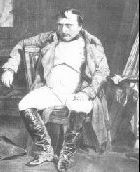
CHAPTER XVIII

Denouement and Epilogue
Etienne, upon arrival at the Parma post house, arranged for the dueling pistols to be returned to the Princess Pauline. She might need them more than he. He was on the next coach out of the city and heading west. The perfumed kerchief, he kept.
At Antibes, he found the 102me redeployed but for the cadre and he rejoined them. A letter from Colonel Anatole de Montesquiou explained Private Neville's absence to the satisfaction of all concerned. He remained quietly at Antibes standing atop the walls until the fortunes of war had him being released a few months later.
The young man's parents received the warmest of embraces when he returned home. His mother wept for happiness to see him cheerfully out in the fields beside his father that very next morning.
Within a year, Etienne had taken a good wife and she came to join the family. He would thereafter make her happy every day of her long life. Our hero went on to become a great husband and a great farmer. By 1823, the Nevilles had purchased three other neighboring farms. Through hard work, prudence, and fortune they were quite prosperous.
With the coming of the Second Republic, Etienne was elected to the Constituent Assembly. He was popularly elected as a moderate and though he never did become a quality speechmaker, he demonstrated character and caring in all that he did.
When M. Etienne Neville died in 1865 (two years after the passing of his dear wife) it was agreed by all who knew such things that he was a man of mark.
***********
Emperor Napoleon Bonaparte was defeated at the Battle of Waterloo little more than two months after the events described at Vienna. Abdicating once more, he was exiled to the Island of St Helena off the southern coast of Africa. He died on that lonely rock six years later.
Two months after word of Napoleon's death reached the continent, Marie Louise, Duchess of Parma, married Count Adalbert von Neipperg. By that time, she had already bore him two sons. Following Neipperg's death, the woman married her Grand Chamberlain.
Napoleon's son, who would eventually become the Duke of Reichstadt, would remain a prisoner of the Emperor of Austria throughout the remainder of his life. It was forbidden for any to call him by his given name and he was not permitted to speak French.
As a young man, he grew into a natural soldier and rider. Rising to the rank of Major, his company of Austrian soldiers would cheer his arrival on parade. He was renowned for his politeness, conversation and wit but also he was remarkably considerate to all he met.
At only the age of twenty-one, Napoleon II died after a long bout of illness. Some say that Metternich and Hager poisoned him but some will always say such things. He was to see his mother six times after the events in this tale.
Sir Sydney Smith overstayed his welcome in Vienna and travelled to Belgium to rejoin his friend, the Duke of Wellington.. Arriving at Waterloo Battlefield just as it was ended, he would spend the night tending and aiding the wounded of both armies as well as he was able.
Pauline Bonaparte and Camillo Borghese remained married yet estranged for another ten years. They reconciled in 1825, three months before her death. Laid out on her deathbed in her finest dress and jewels, Pauline's last words were reported to be "I am still beautiful. I can die now."
Fin